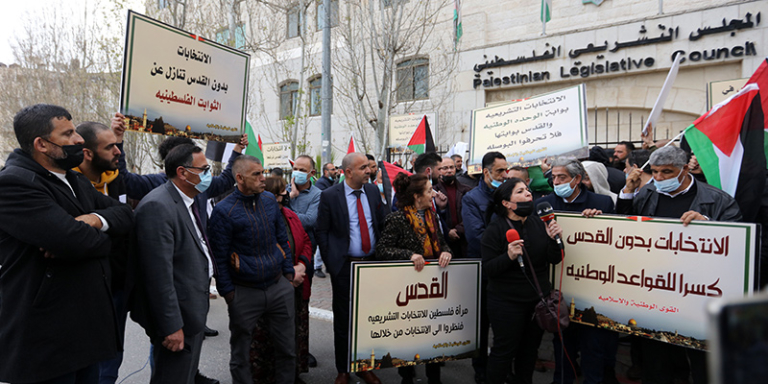
Fifteen years have elapsed since the last elections in Palestine, and now Palestinians are poised to hold a new round for the Legislative Council of the Palestinian National Authority (PA) on May 22. These will be followed by a poll to choose the president of Palestine on July 31, and possibly another to vote for officials of the Palestine Liberation Organization itself at a later date. There have been many obstacles to holding these elections and genuine doubt whether such an exercise could be truly fair and democratic under conditions of military occupation. Israel routinely threatens candidates, imprisons activists, and arrests elected officials and holds them under administrative detention without charges or trials. More to the point, Palestinian elected officials have little real power and are severely constrained by the provisions of the Oslo Accords between the PLO and Israel, as they are interpreted by the latter. It is also still unclear whether elections will in fact be held in May at all. The right of Palestinians in East Jerusalem to vote in this poll could well end up undermining the whole process altogether.
The Oslo Ambiguities and Confusion
The problem started in 1994 when the Oslo Accords pointedly left the issue of the status of Jerusalem as part of the “permanent status negotiations” to be resolved within five years. Over a quarter of a century later, no resolution was reached, and that “Interim Agreement” seems to be the only accord available to address this issue.
The Interim Agreement of 1994 was between the PLO and the State of Israel and set up the Palestinian Authority, which provided for Palestinian elections for both the Legislative Council and the presidency. Article XI explicitly specified that “The two sides view the West Bank and the Gaza Strip as a single territorial unit, the integrity and status of which will be preserved during the interim period.” Articles III and IV also mention that PA legislative council members will be “directly and simultaneously elected by the Palestinian people of the West Bank, Jerusalem and the Gaza Strip.” These express provisions clearly call for participation of East Jerusalemites in the elections. Nevertheless, Israel has not hesitated to breach the Oslo Accords whenever it has chosen to do so, while requiring Palestinians to abide by all their precepts.
The Interim Agreement of 1994 was between the PLO and the State of Israel and set up the Palestinian Authority, which provided for Palestinian elections for both the Legislative Council and the presidency.
Having illegally annexed East Jerusalem, Israel has been treating it as part of the Israeli state and was reluctant from the very beginning to allow the city’s residents to vote in elections for the PA. A compromise was reached during the first Palestinian elections in 2006, held under this agreement, that allowed East Jerusalemites to cast their ballots either in the postal offices in Jerusalem (as if they were casting absentee ballots), or to vote in person in nearby suburbs outside the annexed area. Israel also made it difficult for candidates to campaign in East Jerusalem, took down posters and materials, and later refused to allow the elected candidates to have offices in the city to serve their constituents. Winners were forced to open offices in al-Ram, outside the Jerusalem municipal boundaries. Additionally, Israel unilaterally passed a law, ostensibly implementing the Oslo Accords, but it specifically restricted and criminalized any activity by the PA or its officials in East Jerusalem.
Ironically, all this happened when relations between the PA and Israel were going smoothly, with an Israeli government fully committed to the Oslo Accords and eager to have elections held to give legitimacy to the process. Subsequent Israeli governments have included ministers from extremist parties openly hostile to the Oslo process. Israel tightened its grip over East Jerusalem, built the Separation Wall, and strictly enforced the above-mentioned law that made it a criminal offense for the PA or its officials to carry out any activities in Jerusalem. Israel used its law to forcibly ban meetings, including cultural events, that it alleged were sponsored by the PA. An example was an event to be held by the French consulate’s cultural center, which Israel claimed violated the Oslo Accords because it was allegedly supported by the PA. Apparently, the invitation to that event stated that it was done “under the auspices of” the Palestinian Ministry of Culture, and that was unacceptable to Israel.
For Palestinians, East Jerusalem Is Essential
For their part, Palestinians have insisted that East Jerusalemites should be allowed to vote in Palestinian elections. Anything less, they argue, would constitute acquiescence and legitimization of Israel’s claims to East Jerusalem and tacit approval of its annexation. President Abbas has been adamant about including Jerusalem in any Palestinian elections, stating that without the city’s vote, no such poll would be held. After Abbas’ election decree, a member of Fatah’s central committee explicitly stated the agreement among all the Palestinian factions that if Jerusalemites are not allowed to vote, the elections would not be held at all. That being the case, it is entirely possible that either Israel or PA President Mahmoud Abbas will use this issue to cancel or indefinitely postpone the elections.
If East Jerusalem is not allowed to participate in the Palestinian elections, it is entirely possible that either Israel or PA President Mahmoud Abbas will use this issue to cancel or indefinitely postpone them.
In fact, for several years, internal divisions between Fatah and Hamas were the largest obstacle to holding Palestinian elections. Both appeared comfortable with the status quo and were not eager to see democratic changes. However, as a result of intensive agitation by grassroots movements, these divisions were finally resolved by an agreement between Fatah and Hamas over a number of procedural issues relating to the elections. The two sides agreed to hold a vote for the Legislative Council and president consecutively instead of simultaneously (as previously demanded by Hamas). They also agreed to set up a system by electoral lists, treating all the occupied territories as one precinct (and therefore avoiding the fragmentation that allowed Hamas to win the last round of elections, held in 2006, even though Fatah had a greater number of votes cast in its favor in the popular vote). There was even talk of running a joint Fatah-Hamas list, but these plans were scrapped largely as a result of grassroots opposition. Another reason was a recent poll by the respected Palestinian Center for Policy and Survey Research, run by Khalil Shikaki, that predicted such a joint list would garner only 44 percent of the total vote, while separately, Fatah and Hamas could get more than 70 percent. The new understandings were enacted into law by a series of presidential decrees that paved the way for the upcoming elections.
The Danger of Canceling the Elections
Nonetheless, there is still a danger that the issue of voting by East Jerusalemites may be used to cancel the elections altogether, or to offer an excuse for any party that wishes to avoid holding them. Those with this view maintain that the status quo is comfortable for Israel, Fatah, and Hamas, and the results of elections are hard to predict as they may bring into power different individuals and forces from those in control in Ramallah today, i.e., Fatah and its allies. This possible outcome became clear as the final day for registration arrived and all parties had to officially declare their lists of candidates. The Fatah List of Mahmoud Abbas now features younger and more popular professionals and does not include the traditional top politicians of the organization.
The status quo in the occupied territories may be comfortable for Israel, Fatah, and Hamas, and the results of elections are hard to predict as they may bring into power different individuals and forces from those in control in Ramallah today.
The official Fatah List, however, which appears to hold a narrow majority, must now compete not only with Hamas, but also with the Future (Mustaqbal) List controlled by Mohammed Dahlan, a renegade from Fatah who currently lives in the United Arab Emirates, with Samir al-Mashharawi heading the list and Sari Nusseibeh running with him. They must also compete with another group that targets individuals who normally would be considered Fatah voters; this “Freedom List” is led by Nasser al-Qudwa, the former Palestinian representative at the United Nations, and is supported by the popularly regarded prisoner in an Israeli jail, Marwan Barghouti, whose wife is number two on that list. It is also possible that Hamas expects it would do better this time around and demand a role in the government of the West Bank as well as Gaza.
Despite these drawbacks, and the fact that the PA Legislative Council has not been very effective, there is great interest in the elections by the Palestinian people, who yearn to see change and who want their voices heard, even under the restraining conditions of Israeli occupation. The level of participation is expected to be very high and fears that the elections would be prevented by Israel are still very strong. As the PA grows weaker and weaker and loses much of its credibility, elections are viewed as one means to bolster its standing. In all cases, the elections will be a true test of the popularity of the different factions, even if the results do not lead to true power and genuine self-government due to the restrictive conditions of Israel’s military occupation.
At present, there are reported efforts by the European Union, the United States, and others to urge the Israelis to permit the elections to proceed. What is worrying, however, is a new American position articulated by an unnamed US source that although the United States welcomes free and transparent Palestinian elections, it would understand “the possibility of postponing the elections for some time.” The present right-wing government in Israel has little incentive to allow any softening of its position on Jerusalem, nor to facilitate—or even allow—the elections to take place. It is already arresting Hamas members in West Bank raids, detaining candidates based in Jerusalem, and threatening others if they insist on running in the elections.
The desired path forward for the elections would be to allow all Palestinians in East Jerusalem, the Gaza Strip, and the occupied West Bank to vote; but the likely one could be to follow the compromise formula used in the past and permit East Jerusalemites to vote either as absentees in special boxes at the post offices in Jerusalem, or in person at locations outside the municipal boundaries of the city. It is not at all certain however, if Israel, under the current right-wing government, would permit this or would refrain from physically prohibiting such voting altogether.
The demand by Palestinian Premier Shtayyeh that Israel allow the participation of Palestinians from Jerusalem in the election (and his calls to Europe to put pressure on Israel to do so), coupled with the aforementioned agreement among Palestinian factions regarding the impossibility of holding elections if Jerusalemites were not included, may provide Israel the opportunity to make the Palestinians themselves cancel the elections. It may also be just the excuse Mahmoud Abbas or others currently in office would latch upon to cancel the elections and blame Israel. For most Palestinians, this would be tragic indeed. It is, of course, outrageous that Israel has so much control over attempts of Palestinians to exercise even this level of minimal democracy. It would be a mistake to allow Israeli intransigence on Jerusalem to sabotage the first elections allowed to Palestinians since 2006.

